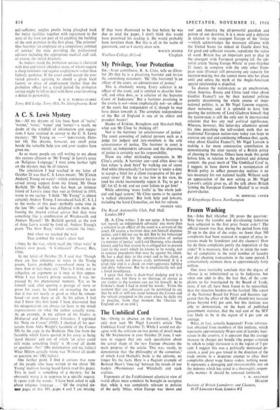Frozen Washing SIR,—John Bull (October 28) poses the question: Why
have the laundry and dry-cleaning industries been subjected to the first price freeze order? The official reason was that, during the period from July 20 up to the date of the order, no fewer than 300 complaints had been received in respect of price in- creases made by launderers and dry cleaners! How far do these complaints justify the imposition of the order? It is necessary, first of all, to relate the num- ber of complaints to the total number of laundry and dry cleaning transactions in the same period; I conservatively estimate these at approximately forty million.
One must inevitably conclude that the degree of offence is so infinitesimal as to be ludicrous, but when one adds to this, the fact that, of the com- plaints so far investigated by the Board of Trade, most, if not all, have been found to be unjustified, then the situation borders on the farcical. The report of the National Board for Prices and Incomes sug- gested that the effect of the SET should not increase prices beyond per cent, but this institute was able to demonstrate, on the basis of published government statistics, that the real cost of the SET was likely to be in the region of 6 per cent on average.
What, in fact, actually happened? From informa- tion obtained from members of this institute, which represents approximately 90 per cent of laundry busi- nesses in the country, it is apparent that the average increase in charges per bundle (the proper criterion by which to judge increases) is in the region of 5 per cent. I suggest this was a politically motivated de- cision, a quid pro quo tossed in the direction of the trade unions in a desperate attempt to allay their complaints about wage freeze orders, nothing more. It represents a damaging and unwarrantable slur on the industry which has acted in a thoroughly respon- sible manner. It should be removed forthwith.
16-17 Lancaster Gate, London W2






































 Previous page
Previous page